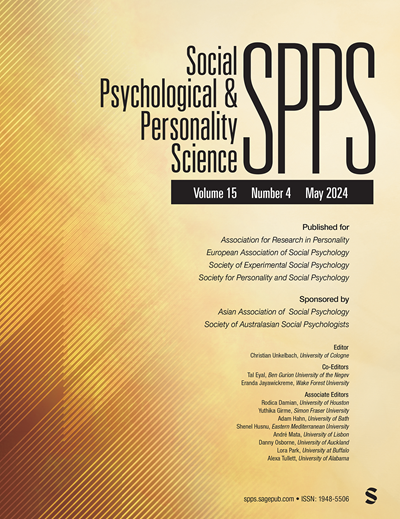长期封锁背景下的社会经验动态
IF 3.3
2区 心理学
Q1 PSYCHOLOGY, SOCIAL
引用次数: 0
摘要
社会互动和孤独感已经引起了很多研究的兴趣。然而,他们之间关系的走向尚不清楚——是社会互动塑造了孤独,还是孤独塑造了互动的意愿?我们探讨了在特殊情况下这些社会经历的动态:COVID-19封锁,这对公共卫生是必要的,但影响了人们的社会生活。我们调查了澳大利亚封锁内外的社交互动与孤独感之间的关系。我们使用经验抽样方法在一周内追踪了233人(Mage=30;8495项调查),这段时间是世界上最长的封锁时期之一。虽然孤独感并不能预测随后的社交活动,但有社交活动预示着随后的孤独感会降低,尤其是在禁闭期间(相对于外出)。这些发现表明,社交互动可能会限制孤独感,尤其是在身体隔离的情况下。简而言之,我们与他人分开的时候可能是我们从与他人互动中获益最多的时候。本文章由计算机程序翻译,如有差异,请以英文原文为准。
Dynamics of Social Experiences in the Context of Extended Lockdown
Social interaction and loneliness have received much research interest. However, the direction of their relationship is unclear—does social interaction shape loneliness, or does loneliness shape willingness to interact? We explored dynamics of these social experiences under exceptional circumstances: COVID-19 lockdowns, which were necessary for public health but impacted people’s social lives. We investigated the relationship between social interaction and loneliness in and out of lockdown in Australia. We used experience sampling methodology to follow 233 people across 1 week ( Mage=30; 8,495 surveys) in a period that spanned one of the longest lockdowns in the world. Although loneliness did not predict subsequent social interaction, having a social interaction predicted lower subsequent loneliness, particularly in (vs. out of) lockdown. These findings suggest social interactions may limit loneliness, especially during physical isolation. In short, times when we are apart from others may be times we benefit from interacting with them the most.
求助全文
通过发布文献求助,成功后即可免费获取论文全文。
去求助
来源期刊

Social Psychological and Personality Science
PSYCHOLOGY, SOCIAL-
CiteScore
12.50
自引率
1.80%
发文量
77
期刊介绍:
Social Psychological and Personality Science (SPPS) is a distinctive journal in the fields of social and personality psychology that focuses on publishing brief empirical study reports, typically limited to 5000 words. The journal's mission is to disseminate research that significantly contributes to the advancement of social psychological and personality science. It welcomes submissions that introduce new theories, present empirical data, propose innovative methods, or offer a combination of these elements. SPPS also places a high value on replication studies, giving them serious consideration regardless of whether they confirm or challenge the original findings, with a particular emphasis on replications of studies initially published in SPPS. The journal is committed to a rapid review and publication process, ensuring that research can swiftly enter the scientific discourse and become an integral part of ongoing academic conversations.
 求助内容:
求助内容: 应助结果提醒方式:
应助结果提醒方式:


